Prisoners Strike for Just Demands: A Courageous Fight That Must Be Supported!
| Revolution Newspaper | revcom.us
UPDATE: As the widespread prisoners strike that began on August 21 enters its third week, resistance and repression are both intensifying. For the full story on this strike, see below. Because of censorship by the authorities, information about what is going on with the strike is hard to come by. An August 28 press statement from strike support organizers said that prisoners were known to be participating in 11 states—Arizona, North Carolina, South Carolina, Georgia, Washington, California, Texas, New Mexico, Indiana, Ohio, and Florida—with work stoppages, hunger strikes, and boycotts of prison commissary. Prisoners at a jail in Halifax, Nova Scotia, Canada reportedly went on strike in solidarity as well as with their own demands.
In Florida, there were unconfirmed reports of 11 of the state’s 143 prisons being struck by organized protests. In Indiana, prisoner rights activists announced that on August 27, several men in the SHU (Secure Housing Unit) of Wabash Valley prison were starting a hunger strike. The group Northwest Detention Center Resistance reported on August 31 that 62 prisoners at the immigrant prison in Tacoma, Washington, were on hunger strike, with another 20 sent to solitary the previous evening in retaliation for joining the protest. The prisoners issued a statement that they were “acting with solidarity for all those people who are being detained wrongfully and stand in support of all those women who have been separated from their children.”
There have been hundreds of solidarity actions on the outside. Rallies, phone zaps to prison authorities, banner drops about the strike, and teach-ins have been taking place in dozens of big cities and small towns from coast to coast—for example, a march of 70 in New Haven, Connecticut, and a rally of 500 in front of San Quentin prison in the San Francisco Bay Area. A support rally outside the Hyde prison in Fairfield, North Carolina, with chants and banners was met with over 100 prisoners joining in the political protest on the other side of the barb wired fence. The men stood in the yard for about an hour, in the face of guards threatening them, and held up their bed sheet banners that read “better food,” “in solidarity,” and “parole.”
Even before the strike started, the prison authorities had been carrying out increased repression against the prisoners and especially the leaders. A spokesperson for the Incarcerated Workers Organizing Committee told the Guardian, “The retaliation and repression was instantaneous and constant. Leaders were picked off, one by one, and thrown into solitary in anticipation of the strike that was coming.” One prisoner, Kevin Rashid Johnson, wrote in an op-ed published in the Guardian that he was moved to a death row cell in another prison in Virginia: “I have never been sentenced to the death penalty, so there can be only one reason they have put me here—to shut me up and prevent me fraternizing with other prisoners as they fear I will radicalize them and encourage them to resist their oppression.”
The courageous and determined rallying cry from those brutalized and locked inside the dungeons of the so-called “land of the free” has gained attention around the world—including coverage in the Middle East (Al Jazeera) to Latin America (teleSUR). Prisoners’ demands and stories have been spread on social media, in the alternative media, and commented on in a few mainstream media (though news of the strike has been mainly suppressed in the latter so far). Prisoners in Greece and Palestine have issued statements supporting the strike.
The strike is set to continue until September 9, the anniversary of the Attica Prison uprising. Word about this righteous struggle of the prisoners—demanding recognition of their humanity—must spread further. And retaliation by the authorities against the strikers must be denounced and opposed.
See recent interview on The Michael Slate Show with Heather Anne Thompson, author of Blood in the Water: The Attica Prison Uprising of 1971 and Its Legacy, about this current strike.
*********
On August 21—the 47th anniversary of the murder of the revolutionary leader George Jackson by guards at California’s San Quentin prison—prisoners in 17 states began a strike. The strike is set to end September 9—the anniversary of the heroic 1971 rebellion at Attica prison in New York.
The demands of the striking prisoners are first and foremost that there be “Immediate improvements to the conditions of prisons and prison policies that recognize the humanity of imprisoned men and women.” Other demands include ending prison slavery, ending “gang enhancement laws targeting Black and brown humans," and rescinding laws that remove all possibility of “rehabilitation and parole” for prisoners. The complete list of demands are available online here.
The prisoners said that as part of the strike, they will carry out: work strikes (“Prisoners will not report to assigned jobs”); sit-ins (“In certain prisons, men and women will engage in peaceful sit-in protests.”); boycotts (“All spending should be halted.”); hunger strikes (“Men and women shall refuse to eat.”). The British newspaper Guardian wrote that this action, in the country that has by far the biggest prison population in the world, “has the potential to be the largest prison strike in U.S. history.”
Jailhouse Lawyers Speak, a group helping publicize the strike, wrote, “Prisoners understand they are being treated as animals. Prisons in America are a warzone. Every day prisoners are harmed due to conditions of confinement. For some of us it’s as if we are already dead. So what do we have to lose?”
According to an August 24 report on the Marshall Project website, "Organizers say they have confirmed accounts of participation at Northwest Detention Center, an immigration detention center in Washington; Folsom State Prison in California; McCormick Correctional Institution in South Carolina; and Toledo Correctional Institution in Ohio. They have relied mostly on the word of families and volunteers who have been in touch with participating inmates."
Lee “Correctional Institute,” South Carolina
A press release calling for the strike said it was particularly in response to the repressive actions of prison authorities after a deadly outburst of fighting between prisoners tore through South Carolina’s Lee “Correctional” Institute in April of this year. One prisoner there told the Associated Press that bodies of dead and wounded men were “literally stacked on top of each other.” Prison and medical authorities allowed bleeding, beaten, and sometimes mortally wounded prisoners to lie unattended on the floor for hours. The press release calling for the current strike said, “Seven comrades lost their lives during a senseless uprising that could have been avoided had the prison not been so overcrowded from the greed wrought by mass incarceration, and a lack of respect for human life that is embedded in our nation’s penal ideology.”
Prison and government authorities blamed the violence at Lee on “gang warfare.” But Heather Ann Thompson, author of Blood in the Water: The Attica Prison Uprising of 1971 and Its Legacy, wrote in the New York Times, “Yes, it was a gang fight, prisoners tell me, but it was corrections officials who had decided to house rival gangs in the same dormitory, and it was the officials’ increasingly punitive policies that exacerbated tensions on the inside. … Punitive sentencing laws have taken away prisoners’ hope for the future. … Daily degradations grind away at men’s souls.”
A System Steeped in Oppression
Massive numbers of people, especially Black, Brown, and Native American youth, are behind bars in this country. Millions are held in inhumane conditions that amount to systematic, protracted torture. This is the reality and the future that the system of capitalism-imperialism has inflicted upon generation after generation of youth. It is utterly fucking unacceptable, and it must stop!
The prisoners in South Carolina and elsewhere are struggling to overcome the depraved outlook imposed by this system and its enforcers that sets them at each other’s throats. Their courageous fight must be supported. It must inspire people within and outside the “concrete and barbed wire” to build a movement for revolution aimed at overthrowing the system that offers millions of youth nothing but brutality, impoverishment, oppression, and imprisonment, and poisons them with the outlook of a system based on relentless exploitation of the many by the few.
Prison authorities are trying to prevent word and information on what is going on inside from reaching the outside world. Revcom will report more on this strike as information becomes available. Readers with knowledge of the strike at any location should correspond to us at revolution.reports@yahoo.com
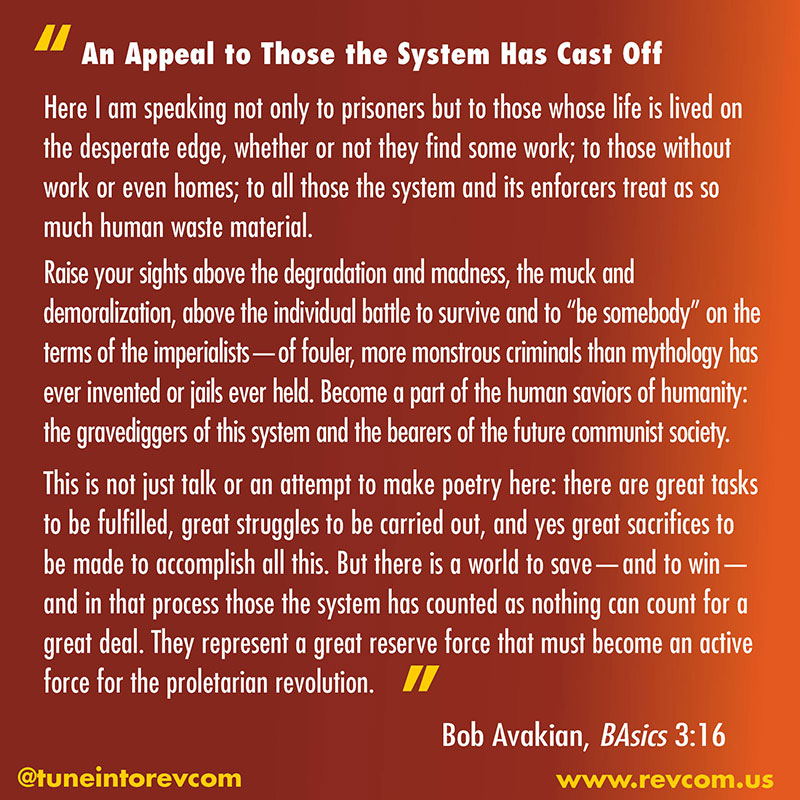
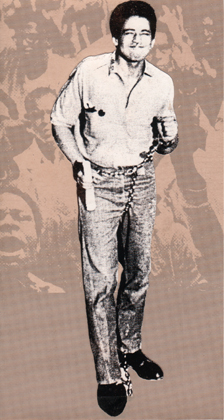
George Jackson
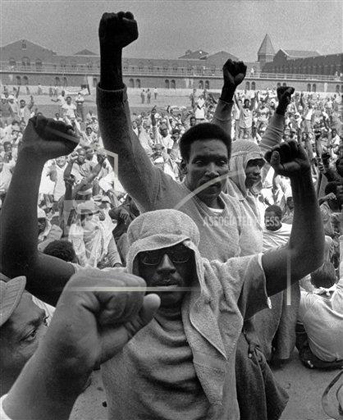
Attica Prison Rebellion
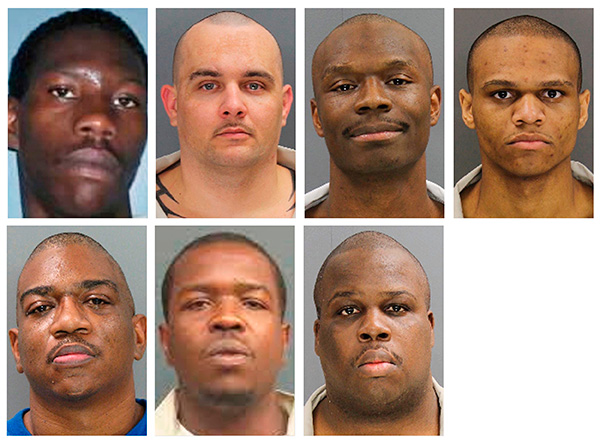
The press release calling for the strike said, “Seven comrades lost their lives [at Lee Correctional Institute] during a senseless uprising that could have been avoided had the prison not been so overcrowded from the greed wrought by mass incarceration, and a lack of respect for human life that is embedded in our nation’s penal ideology.”
THE PRISONERS REVOLUTIONARY LITERATURE FUND
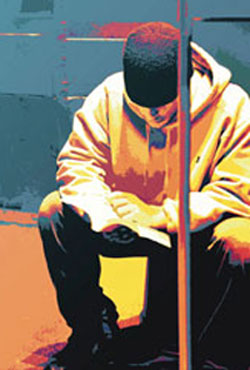 PRLF is an educational literature fund that has sent Revolution newspaper (www.revcom.us), works from Bob Avakian, (Chairman of the RCP) and other revolutionary and scientific literature to hundreds of prisoners across the U.S. for 10 years. PRLF has fought attempts by prison officials to censor these publications. For example, the ACLU of Southern California successfully represented PRLF in a censorship battle focused on Pelican Bay State Prison with statewide ramifications in California.
PRLF is an educational literature fund that has sent Revolution newspaper (www.revcom.us), works from Bob Avakian, (Chairman of the RCP) and other revolutionary and scientific literature to hundreds of prisoners across the U.S. for 10 years. PRLF has fought attempts by prison officials to censor these publications. For example, the ACLU of Southern California successfully represented PRLF in a censorship battle focused on Pelican Bay State Prison with statewide ramifications in California.
Donate here to support the work of the Prisoners Revolutionary Literature Fund.
Get a free email subscription to revcom.us:

Volunteers Needed... for revcom.us and Revolution
If you like this article, subscribe, donate to and sustain Revolution newspaper.
